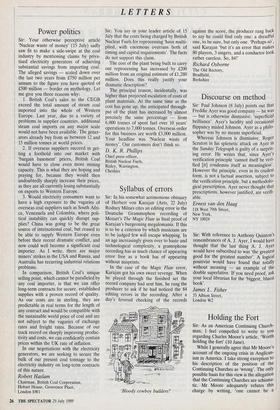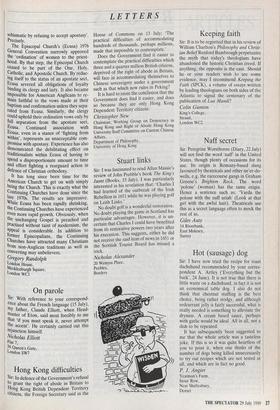Holding the Fort
Sir: As an American Continuing Church- man, I feel compelled to write to you regarding Charles Moore's article, Worth holding the fort' (10 June).
While I generally agree that Mr Moore's account of the ongoing crisis in Anglican- ism in America. I take strong exception to his description of the position of the Continuing Churches as 'wrong'. The onlY possible basis for this view is the allegation that the Continuing Churches are schisma- tic. Mr Moore adequately refutes this charge by writing, 'one cannot be a LETTERS
schismatic by refusing to accept apostasy'. Precisely. The Episcopal Church's (Ecusa) 1976 General Convention narrowly approved the 'ordination' of women to the priest- hood. By that step, the Episcopal Church ceased to be part of the One, Holy, Catholic, and Apostolic Church. By reduc- ing itself to the status of an apostate sect, Ecusa severed all obligations of loyalty binding its clergy and laity. It also became Impossible for American Anglicans to re- main faithful to the vows made at their baptism and confirmation unless they sepa- rated from Ecusa. Similarly, the clergy could uphold their ordination vows only by hill separation from the apostate sect, Ecusa. Continued association with Ecusa, even in a stance of 'fighting from Within', represents an unacceptable com- promise with apostasy. Experience has also demonstrated the debilitating effect on traditionalists within Ecusa of having to spend a disproportionate amount to time and effort fighting a rearguard action in defence of Christian orthodoxy.
It has long since been time for the American Church to get on with simply being the Church. This is exactly what the Continuing Churches have done since the late 1970s. The results are impressive. While Ecusa has been rapidly shrinking, the Continuing Churches have experienced even more rapid growth. Obviously, when the unchanging Gospel is preached and practised without taint of modernism, the appeal is considerable. In addition to former Episcopalians, the Continuing Churches have attracted many Christians from non-Anglican traditions as well as converting may unbelievers. Gregory Randolph London House,
Mecklenburgh Square, London WC1



















































 Previous page
Previous page